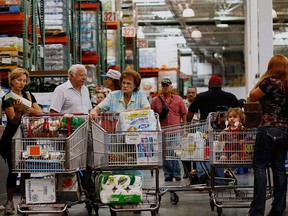Loss of 25% of their revenue in the last month will trigger wage and rent subsidies
Article content
The federal government announced key, temporary changes to aid and support for businesses in light of new restrictions across Canada to deal with the raging Omicron variant of COVID-19.
Advertisement
This advertisement has not loaded yet, but your article continues below.
Article content
The changes, announced Wednesday by Prime Minister Justin Trudeau and other top government officials, include expanding existing programs to allow more businesses to qualify for aid by taking into account the impact of new restrictions on capacity in provinces including Quebec, Ontario and Nova Scotia.
“We’re going to be there for the hardest hit regions, for specific sectors like art and culture, hospitality and tourism,” Trudeau said during a virtual news conference. “A few days from Christmas, I know that many of you are concerned. Today, we are adapting our measures to make sure no one is left behind.”
Deputy Prime Minister Chrystia Freeland said the tweaks will allow businesses to qualify for wage and rent subsidies if they have lost 25 per cent of their revenue in the past month against 2019 numbers, compared to the previous threshold of 40 per cent. The federal government will subsidize up to 75 per cent of revenue declines.
Advertisement
This advertisement has not loaded yet, but your article continues below.
Article content
Meanwhile, lockdown provisions were tweaked to kick in even when businesses are not shut down entirely. The new provision, which expands the Local Lockdown Program, is triggered if capacity is reduced by 50 per cent or more.
A separate, expanded Canada Worker Lockdown Benefit will provide $300 a week in income support to eligible workers who are directly affected by a COVID-19-related public health lockdown or capacity restrictions, and lost 50 per cent or more of their income as a result.
We’re going to be there for the hardest hit regions, for specific sectors like art and culture, hospitality and tourism
Prime Minister Justin Trudeau
Both programs are in place from Dec. 19 to February 12, 2022, after which they are set to revert back to their original provisions under the newly passed Bill C-2.
Under the non-amended programs, the bill only gave support to businesses under full lockdowns, not capacity limits.
Advertisement
This advertisement has not loaded yet, but your article continues below.
Article content
Before the temporary amendment, workers had to face a lockdown order of 14 days. Now, that’s reduced to a seven-day order and includes capacity limits.
Public companies that take aid will have it clawed back if they increase executive compensation while taking the funds, Freeland said. They will also be ineligible if they pay dividends, she said.
The temporary support will help households and businesses weather virus curbs implemented by governments, boosting economic recovery if there’s a pullback as a result of restrictions, Claire Fan, economist at Royal Bank of Canada, said by email.
“As in prior periods, household purchasing power will be maintained, so spending should bounce back quickly once containment measures are eased again,” Fan said. “The weekly payment floor is lower than it was in prior programs, but the expansion in eligibility from workers in complete lockdowns to those facing restrictions 50 per cent or more means many can now stay employed while collecting benefits. Maintaining that employer-employee relationship will be important once restrictions are eased again.”
Advertisement
This advertisement has not loaded yet, but your article continues below.
Article content
Fan said the uncertainty of Omicron’s spread makes it hard to predict the immediate impact to Canada’s output, but high vaccination rates and accelerated booster shots are expected to help.
Bill C-2, which Ottawa passed last week, targeted aid to help businesses cope with the ongoing COVID-19 pandemic, but restaurant and other small business groups said it was already outdated in light of fresh restrictions across the country to deal with the fast-spreading Omicron variant.

In tandem, the Ontario government also announced Wednesday that businesses affected by recent public health measures can apply for rebates on property taxes and energy costs.
The province’s new benefit will cover up to 50 per cent of the property taxes and energy costs of eligible businesses while they’re affected by public health restrictions. The new Ontario Business Costs Rebate Program will start accepting applications in mid-January, but the rebates will be retroactive to Dec. 19, when the latest round of restrictions came into effect.
Advertisement
This advertisement has not loaded yet, but your article continues below.
Article content
The Ontario Chamber of Commerce welcomed the relief measures but urged both the federal and provincial governments to expedite delivery.
“Our concern is whether these measures will be sufficient to prevent a wave of business closures,” Rocco Rossi, CEO of the chamber said in a statement. “For example, applications for the Ontario Business Costs Rebate Program will not open until mid-January. This delay — along with the limited eligibility of the rebate to energy and property taxes — may not be enough for many small businesses to keep their doors open.”
Advertisement
This advertisement has not loaded yet, but your article continues below.
Article content
Dan Kelly, CEO of the Canadian Federation of Independent Business, endorsed the fresh support provided by the federal government after his association had warned that small business owners were hemorrhaging from the ebb and flow of COVID-19 measures. However, there are still gaps in support from both levels of government, he said.
“Sadly, it’s not going to address the situation for businesses that are seeing their customers dry up because of (COVID-19) panic,” Kelly said of federal support in an interview. “The provincial programs are also incomplete. Ontario’s is really, really poor,” he said, criticizing the timeline of when the government would implement the rebate program.
Olivier Bourbeau, vIce-président of Quebec and federal affairs at Restaurants Canada, said his organization got much of what they were asking for as capacity limits are hammering eateries in the usually busy pre-Christmas period.
“The fact that the Lockdown Support Program now applies when there are capacity limit in place — and not only when we are entirely closed — is a really good, and will save some restaurants without a doubt,” he said.
Virus cases are surging across the country. Quebec and British Columbia shuttered parts of their economies in response, closing gyms, cinemas and bars. Canada reported more than 11,000 cases of the virus on Wednesday, with Omicron emerging as the dominant strain in Ontario, Quebec and B.C.
Financial Post
• Email: bbharti@postmedia.com | Twitter: biancabharti
• Email: bshecter@nationalpost.com | Twitter: BatPost
Advertisement
This advertisement has not loaded yet, but your article continues below.
Ottawa to expand aid for businesses suffering under Omicron restrictions
2021-12-22 20:46:09






